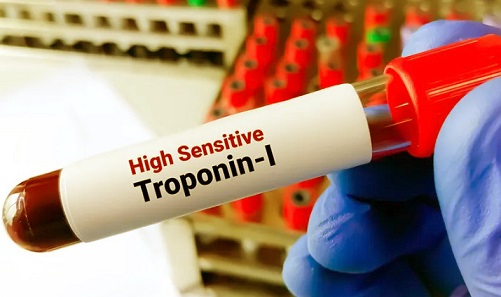Nikhil Prasad Fact checked by:Thailand Medical News Team Nov 04, 2024 5 months, 1 week, 1 day, 23 hours, 28 minutes ago
Medical News: COVID-19 has had a massive impact globally, not only because of the infection itself but due to complications that can worsen outcomes, especially in those with existing health issues. One specific area of concern is how the virus affects the heart, particularly through elevated levels of troponin, a marker of heart injury. Researchers from multiple institutions, including Tanta University Hospital in Egypt, Mouwasat Medical Group in Saudi Arabia, and others from India, Canada, and the United States, conducted a study to explore the relationship between high troponin levels and mortality in COVID-19 patients. This
Medical News report will take a closer look at how the study reveals a clear link between high troponin levels and higher death rates among hospitalized COVID-19 patients.
 High Troponin Levels in COVID-19 Patients Linked to Higher Mortality
Key Findings
High Troponin Levels in COVID-19 Patients Linked to Higher Mortality
Key Findings
In the study, the researchers observed that COVID-19 patients with elevated troponin levels were significantly more likely to have poorer outcomes, including higher chances of ICU admission and death. Troponin is an important biomarker often used to detect heart injury, and elevated levels can indicate stress or injury to the heart muscle. During the study period, 768 COVID-19 patients were admitted to King Saud Medical City. Out of these, 581 patients had their troponin levels measured, with about 15% showing abnormal levels. Interestingly, the death rate among patients with high troponin levels was over 90%, whereas no deaths were reported among patients with normal troponin levels.
Detailed Analysis of Troponin Levels and Mortality
The study categorized patients based on their troponin I levels into three groups: those with normal levels, mildly elevated levels, and markedly elevated levels. The mortality rate was drastically higher among those in the markedly elevated group, highlighting the significance of troponin as a risk marker. Patients with high troponin levels were also more likely to have comorbid conditions like hypertension, diabetes, and pre-existing cardiovascular disease, adding complexity to their care. The findings emphasize that elevated troponin levels can be a serious warning sign, indicating a need for close monitoring and potentially aggressive management.
Exploring Why Troponin Levels Rise in COVID-19
COVID-19 can impact the heart in various ways, including direct viral damage to heart cells, inflammatory responses, and complications from reduced oxygen levels due to lung issues. The researchers noted that some cases might involve non-traditional types of heart injury, possibly due to inflammation and other COVID-19-related complications rather than typical blockages that cause heart attacks. Additionally, COVID-19 can trigger a hypercoagulable state, making patients more susceptible to blood clots, which can further harm heart function. These findings shed light on how COVID-19 can lead to heart injury in complex ways, contributing to a cycle of health deterioration.
High-Risk Groups and Predictors of Mortality
The study identified certain high-risk groups, including older adults and those with pre-existing cardiovascular disease, who were particularly vulnerable to severe outcomes when troponin levels were elevated. Among the 581 patients studied, those with a history of cardiovascular disease had the highest rates of elevated troponin levels and were more likely to be admitted to the ICU. The researchers observed that high troponin levels were linked to more severe cases of acute respiratory distress syndrome (ARDS) and septic shock, two common causes of death in COVID-19 patients. Elevated levels of other markers like creatine kinase, D-dimer, and C-reactive protein were also associated with poorer outcomes.
Statistical Significance of Troponin as a Mortality Predictor
Analyzing the data, the study found that elevated troponin levels were a powerful predictor of death in COVID-19 patients. Patients with markedly elevated troponin levels had a hazard ratio that strongly correlated with a higher risk of death. This correlation remained significant even when other risk factors, such as diabetes and hypertension, were considered. The findings suggest that measuring troponin levels in COVID-19 patients could help identify those at higher risk, enabling timely interventions that may improve outcomes.
Conclusions
The study concludes that elevated troponin levels are a critical indicator of risk for COVID-19 patients, particularly those with pre-existing heart conditions or other health issues. The presence of high troponin levels in these patients often signals a severe disease course, leading to higher chances of ICU admission and death. Recognizing this, healthcare providers might consider prioritizing patients with elevated troponin for intensive care and closely monitoring their heart health.
As the pandemic continues, findings like these help healthcare professionals better understand the complex ways COVID-19 impacts the body, especially the cardiovascular system. By identifying high-risk patients based on troponin levels, medical teams can adopt strategies that may ultimately reduce mortality in these vulnerable groups. For those with underlying health conditions, these insights highlight the importance of preventive measures, including vaccination and careful adherence to health guidelines, to reduce the risk of severe COVID-19 complications.
The study findings were published in the peer-reviewed Journal of Multidisciplinary Healthcare.
https://www.dovepress.com/impact-of-high-troponin-level-on-the-outcome-in-covid-19-positive-pati-peer-reviewed-fulltext-article-JMDH
For the latest COVID-19 News, keep on logging to Thailand
Medical News.
Read Also:
https://www.thailandmedical.news/news/elevated-cardiac-troponin-i-predicts-covid-19-mortality
https://www.thailandmedical.news/news/norwegian-study-shows-that-cardiac-troponin-t-can-be-used-as-a-biomaker-in-moderate-to-severe-covid-19-to-determine-potential-heart-issues
